| Srl | Item |
| 1 |
ID:
153796
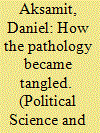

|
|
|
| 2 |
ID:
142875
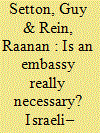

|
|
|
|
|
| Summary/Abstract |
Spanish–Israeli relations expanded across numerous fields throughout the 1960s despite the absence of formal diplomatic ties. For all practical purposes, Israel’s Ministry of Foreign Affairs had a legation in Madrid during the second half of the 1960s, including at least 3 semi-official representatives operating with the full knowledge of Madrid. Clandestinely, a Mossad station worked in liaison with the local intelligence services. Absence of a full-fledged Israeli embassy did not prevent advancing bilateral ties, normalising Jewish affairs in Spain, or preventing both Powers from engaging in official and public occasions or behind the scenes. Systemic pressure, most evident in Madrid’s ascension to GATT, and the need to abide with its rules by liberalising trade with Israel did much to advance Spanish–Israeli bilateral ties in the 1960s. A strong systemic external force also brought change in their relations in the 1980s. The diplomatic breakthrough of January 1986 and establishment of full formal diplomatic relations between the Powers was largely the inevitable result of Spain’s entry into the European Economic Community.
|
|
|
|
|
|
|
|
|
|
|
|
|
|
|
|
| 3 |
ID:
186399
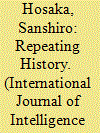

|
|
|
|
|
| Summary/Abstract |
Drawing on the formerly classified in-house journal KGB Collection, this article argues that active measures, commonly known as Soviet foreign influence operations, were the concept and practice in which offensive counterintelligence encroached on foreign intelligence functions. In the 1960s, KGB counterintelligence officers were urged to implement active measures, instead of passive surveillance, by cultivating and recruiting foreign visitors and Soviet citizens with the aim of using them to penetrate Western institutions and collect sensitive intelligence. The counterintelligence directorate occasionally supervised foreign operations to implement offensive tactics. Given the parallels between the Soviet and Russian intelligence services, the expansion of the counterintelligence agency (the Federal Security Service) in post-Soviet Russia can be interpreted as its increased interest in and capabilities for active measures abroad.
|
|
|
|
|
|
|
|
|
|
|
|
|
|
|
|
| 4 |
ID:
168622
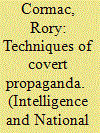

|
|
|
|
|
| Summary/Abstract |
In early 2019, the British government declassified a tranche of Information Research Department files. Among them is a candid and concise overview of British thinking about covert propaganda, complete with a list of examples of British forgery operations. This short piece transcribes the briefing note and provides an introduction. The document sheds new light on UK covert action, but also talks to ongoing scholarly debates in Intelligence Studies and International Relations more broadly.
|
|
|
|
|
|
|
|
|
|
|
|
|
|
|
|
| 5 |
ID:
179065
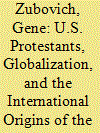

|
|
|
|
|
| Summary/Abstract |
Between World War II and the 1960s, Americans’ sense of what constitutes living in a democracy had transformed. Activists in the left-liberal tradition rejected the status quo and became impatient with slow-paced change, emphasized grassroots participation, and called for racial inclusion. The changes in democratic practice were most pronounced among baby boomer youths, who participated in the free speech movement, in the sit-ins and civil rights marches, in anti-war protests, and in the sexual revolution.
|
|
|
|
|
|
|
|
|
|
|
|
|
|
|
|